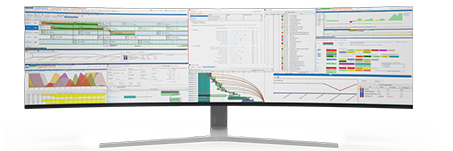Advanced Inventory Optimization Algorithms for JIT Inventory Management
With the demand for just-in-time (JIT) inventory management on the rise, production schedulers are under increasing pressure to streamline operations while minimizing costs and maximizing productivity. Fortunately, advancements in inventory optimization algorithms offer a promising solution to this challenge.
In this blog, we will explore the implementation of advanced inventory optimization algorithms and their integration with leading enterprise resource planning (ERP) systems such as SAP, Oracle, Microsoft, Kinaxis, and Aveva, particularly through the lens of PlanetTogether.
Let's look into how these technologies can revolutionize JIT inventory management in chemical manufacturing facilities.

What is Just-in-Time Inventory Management?
Just-in-time (JIT) inventory management is a strategy aimed at reducing waste and improving efficiency by receiving goods only as they are needed in the production process. This approach minimizes inventory holding costs, reduces excess inventory, and enhances responsiveness to customer demands. However, implementing JIT inventory management requires precise coordination of production schedules, inventory levels, and supply chain activities.

Challenges Faced by Production Schedulers
Production schedulers play a critical role in orchestrating the complex interplay of resources, processes, and materials in chemical manufacturing facilities. They must balance conflicting priorities such as meeting production targets, minimizing inventory holding costs, optimizing resource utilization, and ensuring timely delivery to customers. Traditional scheduling methods often struggle to adapt to the dynamic nature of modern manufacturing environments, leading to inefficiencies, delays, and increased costs.

The Role of Advanced Inventory Optimization Algorithms
Advanced inventory optimization algorithms leverage data analytics, mathematical modeling, and artificial intelligence to optimize inventory levels, production schedules, and supply chain operations. By analyzing historical data, demand forecasts, production capacity, and supply chain constraints, these algorithms can generate optimal production schedules that minimize inventory holding costs while meeting production targets and customer demand.


Integration with ERP Systems
Integration between advanced inventory optimization algorithms and ERP systems is essential for seamless data exchange, real-time visibility, and enhanced decision-making. Leading ERP systems such as SAP, Oracle, Microsoft Dynamics, Kinaxis RapidResponse, and Aveva MES offer robust functionalities for production planning, inventory management, and supply chain optimization.
By integrating these systems with advanced inventory optimization solutions like PlanetTogether, production schedulers can harness the full potential of JIT inventory management.
Benefits of Integration
Real-time Data Sync: Integration enables real-time synchronization of data between the inventory optimization system and the ERP system, ensuring accurate and up-to-date information for decision-making.
Enhanced Visibility: Production schedulers gain comprehensive visibility into inventory levels, production schedules, and supply chain activities across the organization, enabling proactive decision-making and risk mitigation.
Improved Forecasting Accuracy: Advanced inventory optimization algorithms leverage historical data and demand forecasts from the ERP system to generate more accurate production schedules, reducing the risk of stockouts or excess inventory.
Optimal Resource Utilization: By aligning production schedules with resource availability and capacity constraints, integration enables optimal utilization of resources, reducing idle time and maximizing efficiency.
Adaptive Planning: Integration facilitates agile and adaptive planning by enabling production schedulers to quickly adjust schedules in response to changing demand, supply disruptions, or production constraints.
The implementation of advanced inventory optimization algorithms and their integration with leading ERP systems such as SAP, Oracle, Microsoft Dynamics, Kinaxis, and Aveva holds immense potential for revolutionizing JIT inventory management in chemical manufacturing facilities.
By leveraging the capabilities of solutions like PlanetTogether and harnessing the power of data analytics and artificial intelligence, production schedulers can optimize production schedules, minimize inventory holding costs, and enhance efficiency across the supply chain.
Are you ready to take your manufacturing operations to the next level? Contact us today to learn more about how PlanetTogether and integrated scheduling solutions can help you achieve your sustainability goals and drive success in the chemical industry.



